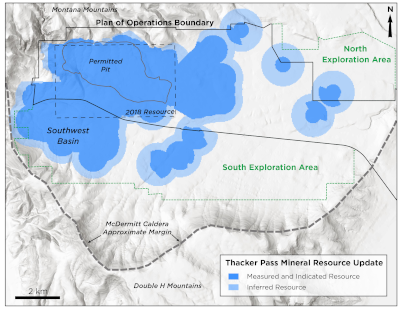
EV makers racing for supplies of lithium for batteries
By Joe Mcdonald, The Associated Press
General AutomotiveSupply uncertainty pushing companies to unprecedent measures to secure long-term lithium sources.

GM has invest $650M in the Vancouver-based Lithium Americas’ Thacker Pass lithium mine in northern Nevada.
(Photo credit: Lithium Americas)
BEIJING (AP) – Threatened by possible shortages of lithium for electric car batteries, automakers are racing to lock in supplies of the once-obscure “white gold” in a politically and environmentally fraught competition from China to Nevada to Chile.
General Motors Co. and the parent company of China’s BYD Auto Ltd. went straight to the source and bought stakes in lithium miners, a rare step in an industry that relies on outside vendors for copper and other raw materials. Others are investing in lithium refining or ventures to recycle the silvery-white metal from used batteries.
A shortfall in lithium supplies would be an obstacle for plans to ramp up sales to tens of millions of electric vehicles a year. It is fueling political conflict over resources and complaints about the environmental cost of extracting them.
“We already have that risk” of not being able to get enough, GM’s chief financial officer, Paul A. Jacobson, said at a Deutsche Bank conference in mid-June. “We’ve got to have partnerships with people that can get us the lithium in the form that we need,” Jacobson said.
Ford Motor Co. has signed contracts stretching up to 11 years into the future with lithium suppliers on two continents. Volkswagen AG and Honda Motor Co. are trying to reduce their need for freshly mined ore by forming recycling ventures.
Global lithium output is on track to triple this decade, but sales of electric SUVs, sports cars and sedans that rose 55% last year threaten to outrun that. Each battery requires about eight kilograms (17 pounds) of lithium, plus cobalt, nickel and other metals.
“There will be a shortage of EV battery supplies,” said Joshua Cobb, senior auto analyst for BMI.
Adding to uncertainty, lithium has emerged as another conflict in strained U.S.-Chinese relations.
Beijing, Washington and other governments see metal supplies for electric vehicles as a strategic issue and are tightening controls on access. Canada ordered three Chinese companies last year to sell lithium mining assets on security grounds.
Other governments including Indonesia, Chile and Zimbabwe are trying to maximize their return on deposits of lithium, cobalt and nickel by requiring miners to invest in refining and processing before they can export.
GM is buying direct access to lithium by investing $650 million in the Canadian developer of a Nevada mine that is the biggest U.S. source. In return, GM says it will get enough for 1 million vehicles a year.
Conservationists and American Indians are asking a federal court to block development of the Nevada mine, which the Biden administration has embraced as part of its clean energy agenda. Opponents say it might poison water supplies and soil and pollute nesting grounds for birds.
Despite rising output, the industry may face shortages of lithium and cobalt as early as 2025 if enough isn’t invested in production, according to Leonardo Paoli and Timur Gul of the International Energy Agency.
“Supply side bottlenecks are becoming a real challenge,” Paoli and Gul said in a report last year.
Automakers might be putting in their own money to reassure “notoriously risk-averse” miners, according to Alastair Bedwell of GlobalData. He said miners are reluctant to “go all out” on lithium until they are sure the industry won’t switch to batteries made with other metals.
Even if they do, developing lithium sources is a years-long process.
Worldwide lithium resources are estimated at 80 million tons by the U.S. Geological Survey. Bolivia’s are the biggest at 21 millions tons, followed by Australia with 17 million and Chile with 9 million.
Forecasts of annual production range as high as 1.5 million tons by 2030. But demand, if EV sales keep rising at double-digit annual rates, is forecast to increase to up to 3 million tons.
EV sales took off in 2021, more than doubling over the previous year to 6.8 million, according to EV Volumes, a research firm. Last year’s sales rose to 10.5 million.
China accounted for 60% of last year’s sales, two-thirds of production and three-quarters of battery manufacturing.
President Joe Biden last year announced an official goal for half of all new cars sold in the United State to be electric or other zero-emissions technology by 2030.
As sales rise, so does official anxiety, especially in Washington and Beijing, about access to lithium and other minerals and the potential for strategic competition.
Volkswagen’s battery unit, PowerCo, signed an agreement with Canada last August to develop suppliers of “critical raw materials” including lithium, cobalt and nickel.
The German chancellor, Olaf Scholz, in a statement welcomed cooperation with “close friends” on “raw material security.”
China’s government has accused the United States, Canada, Japan and other governments of misusing phony security concerns to hurt Chinese competitors in electric cars, smartphones, clean energy and other emerging technologies.
Other governments welcome Chinese investment. China’s biggest lithium producer, Ganfeng Lithium Co., bought Argentina’s Lithea Inc. last year for $962 million.
About two-thirds of the world’s lithium comes from mines. That involves crushing rock and using acids to extract metals. It leaves toxic heaps of chemical-laced tailings. The rest is extracted from salt lakes or salt flats. That can require vast evaporation ponds.
The industry is working on technology to extract lithium from hot springs and clay deposits with less environmental impact.
As they ramp up supplies, automakers face another bottleneck: Lack of refining capacity to purify raw lithium into battery material.
Tesla Inc. is building a refinery in Texas. Others, including BMW AG, are buying stakes in refiners.
As for GM, “I don’t know” whether it will build its own refinery, Jacobson said.
